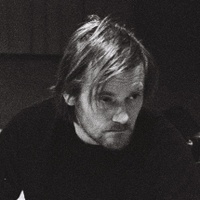As told to Gary Canino, 1541 words.
Tags: Music, Film, Process, Beginnings, Collaboration, Creative anxiety.
On learning to score films
Musician and producer Geoff Barrow discusses how he learned to score films, how movie soundtracks are like the new classical music, why professionalism is boring, and the danger of all music sounding exactly the same.You’ve been playing drums since you were nine. What do you do to keep from getting bored playing the same instrument?
Well, I’ve got an easy way of not getting bored. And that’s not being very good at it. If you’re always struggling at something, you can never get bored. I’m not a natural drummer, but I know what I like myself to sound like, and I know what I like other drummers to sound like. I’m singing as well, which I never, ever thought I would do. There are professional musicians out there who can just play correctly every time. Every time I play, it’s like spinning a wheel. Whether it’s going to be red or black, it could be fucking terrible or it’s going to be okay.
Most musicians that I meet, even younger ones, are too technically versed. If you’re taught technique over feeling or individuality, it becomes so professional that there are no gaps for something like playing drums slightly out of time. It’s weird. But the youth have finally started to really understand how to play quieter, and with dynamics. That’s started to happen a lot more, and I think that’s why we’re seeing a resurgence of jazz with the youth. Because the concept of just playing fucking loud, with as many notes as possible, just really isn’t where it’s at.
I wanted to ask about your history of scoring films. Was learning how to do so similar to learning how to play an instrument?
I’ve always had an interest in film music, and soundtracks. I never called myself a producer, I was just a bloke in a band who would also produce the band. I never call myself a composer either, because I never went and learned how to write notes for a string section. But I’ve ultimately got a love for it like I’ve got a love for music production. And having love for it makes you stay awake at night, analyzing why the things that other people do are really, really good, and why things other people do are really bad, according to your own taste. I overanalyze everything, which I never thought I would.
I work with Ben Salisbury, who’s a traditional film composer. At first, I would bring the weirder electronic stuff, and he would bring the actual film composing side to it. But after we worked together on Ex Machina, that completely went out the window, and we both were doing things together. And now I feel absolutely confident that I know how to score a film, as much as Ben feels confident that he can actually make the fucking random weird noises. Scoring is a real art, as well.It’s a funny industry, because you have people who are very good at soundtracking, and you have people who are very good at scoring. It’s very hard to find someone who’s good at both. So you get a lot of people from the music side like myself, who are good at making a lot of noise as a kind of conceptual underscore. And then what happens is a music editor comes along, chops it up, and turns it into the score that’s actually needed, and that’s really, really common. I didn’t realize how common that was.
And it makes sense, because I was wondering how all of these music guys suddenly knew how to score films. And it’s because they don’t! Well, some of them do. But a brilliant music editor will basically be the brain of it, fitting stems of their audio within the film. Scoring is the hardest thing, though. Underscoring characters talking with a sort of tension or propulsion, or writing themes related to anger, death, horror is a brilliant skill to have, and luckily Ben has that in abundance.
You’ve played some of your soundtracks live before. How do you think people like to experience soundtracks as opposed to music by a live band?
I own Invada Records, and we basically release lots of film scores on vinyl. It’s amazing to see just how many people are getting into the idea of listening to film scores, outside of just listening to a band’s album with 10 tracks. It’s because they want a new musical experience. It’s like reading a book, they want to be taken on a musical journey. It’s basically the modern classical. So where, in the ’40s, ’50s, ’60s, and ’70s people used to buy classical records, and listen to whole suites on vinyl, people are now doing the same thing but with soundtracks and scores.
With BEAK>, do you ever kind of set limitations with overdubs, that way it’s possible to play live with three band members?
Ultimately, we do. We do think, “How the fuck are we going to play this live?” For example, our new single has bongos on it. Usually, I can kind of play bongos and drums at the same time, and it’s not so much of a problem. But I play cowbell in this one, too. So now I’ve got to play cowbell and bongos. I can’t do it. So I might get a mate to come onstage, or our roadie. Generally, we’ll find a way around it. The first BEAK> record was just the three of us playing in a room. We’d never played before in a studio, and that became the first tune on the record.
We still have a very loose attitude towards what is considered perfection and studio etiquette. But if a track needs an extra vocal to thicken up the main vocal, then we’ll do it. Or if the guitar part fucking sounded terrible or it was really out of tune or something, then maybe we’ll do another on top. But you can still hear the other one underneath. So much is about production now. I mean, through the ’80s it was ridiculous. In the ’90s it was ridiculous.And now we’re going back to that whole thing about professionalism, and people being told, “This isn’t professional.” It shouldn’t be like that, it should just be about making music any way you fucking like.
What’s happened is that the industry, radio, and streaming services have led to making every tune sound the same. It doesn’t matter what genre it is. If it’s fucking country, rock, rap, when you look at the frequencies being used on a spectrum analyzer, they’re all the same. The corporate pop and rock industry of yesterday basically just made everything the same frequency. In the old days, if you had an AC/DC track, and then you played The Police, and then you played Human League, and then you played Prince, they would all sound different. They all just do. And now, sonically, it all sounds the same. The music doesn’t sound the same, but sonically it’s all the same. And that’s when I was just like, “I’ve got to get off this fucking boat. Because it’s shit.”
Especially with pop music, it’s all just compressed in a certain way.
Yeah. So, then what happens is, if people sound different, they don’t get on the radio, or they don’t get on the right playlist. Because all of a sudden, you’ve got playlist, radio, and TV producers saying, “Man, that sounds weird. There’s something wrong with that. Is that the demo? Because it sounds weird.” And you go, “No, no that’s the sound of the artist.” And they go, “Nah. That doesn’t really suit our show.” Or it doesn’t suit their fucking yoga workout playlist. So basically, nothing sounds different. So I thought to myself, “Fuck that, I’m just going to make the records I want to make.” I’ve been asked to produce a lot of bands and artists over the years. But I was only going to end up having to make it sound like that shit. And record companies ask why the records I produce sound weird, but they don’t, the records just sound like the artist.
Different frequencies create a different emotion in the listener. I believe in the sonic unconscious. Which sounds really fucking weird, but it basically means that it’s like the sounds of the womb, or the sounds of your childhood. When nothing sounds different, it’s just literally shouting at you all the time. Even if it’s a sad song, or if it’s supposed to be a huge ballad or a fucking massive rock song, it just sonically shouts at you. So the emotion actually dies. There’s no dynamics, and it’s dead. I think that’s what’s actually killing music. And the reason that people aren’t listening to it, and they see it as such a throwaway commodity, is because they can’t connect because they’re just being fucking shouted at.
Essential Geoff Barrow:
-
“When We Fall” by BEAk>
-
“Out” by Ben Salisbury / Geoff Barrow [Ex Machina OST]
-
“The Alien” by Ben Salisbury / Geoff Barrow [Annihilation OST]
-
“The Cornubia” by BEAk>
-
“The Phone Rings” by Ben Salisbury / Geoff Barrow [Free Fire OST]




